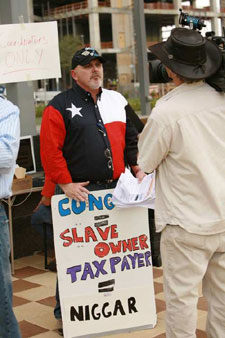
Last night I got an alert that said an arrest was made in the brutal killing of 7-year-old Jazmin Barnes… She was a Black girl riding in a car with her mom who went on a coffee run.
The initial stories that came out was a white man in an unprovoked attack came over and shot Jazmin killing her and then shot her mom. The Barnes killing set off a nationwide manhunt, with offers up to 100k for the arrest of the killer…
Now here’s where things get a little sticky… Over the past few nights, there’s been a huge discussion about the R Kelly documentary, with many of his defenders stating that our collective obsession with Kelly was taking attention away from Barnes killing.
‘Why are we focus on R Kelly who we all knew was a disgusting individual when we have the killer of Jazmin Barnes still at large??’
Now, if we believe the police reports which state that Eric Barnes Jr (pictured above) confessed that he was the driver and another Black man by the name of Larry W did the shooting in a case of mistaken identity, is the impact and horror of Jazmin’s death lessened? Would a 100k dollars have been offered if we knew Eric Black was the man being accused of killing Jazmin? IN another report the police say the mother saw a white man running for cover and thought he was the shooter..
If its a Black man behind the killing of Jazmin does it change the discussion? Was the R Kelly documentary really a distraction or an enhancement as to why we must talk about the harm that is often visited on Black girls and women? Was our concern about a little Black girl being killed or was she just an excuse go to express anger and go HAM on white oppression?
From the looks of things, it seems like, with some folks, Jazmin Barnes killing was being used the same way Trump and white racist used the killing of Kate Steinle at the hands of an undocumented man named Jose Garcia Zarate to stir up anti-immigrant hate and to push for us to build a wall… There was never a concern about Steinle being killed.
So again, was our concern about Jazmin an innocent Black girl being killed or was she just an excuse to push forth a variety of agendas with the protection of Black girls being priority number one?
Black or white, an innocent Black girl is dead. Eric Black Jr and Larry W, R Kelly or a racist white man who caused a nationwide hunt, does it matter? All three, in theory, have caused unthinkable harm to Black girls and women.. Does it matter who the killer is? Do we still hold the same anger? Are we still demanding the killer be arrested and hung? After all, an innocent 7-year-old Black girl is dead. And if we look at this from a wider lens lots of 7-year-old Black girls are also being harmed and mistreated at homes and at institutions they wind up being forced into.
One of the refrains put forth by detractors of the R Kelly documentary is that we should put race first. We need to prioritize our struggle. ‘Focus on the white killer of Jazmin Barnes’ is what they said… What happens if the killer/killers are Black? What’s our focus moving forward? Do we start to have those painful discussions about Black men harming exploiting, pimping etc Black girls? How do we hold those folks involved in that cycyle accountable?




 Parker said he was just being honest and reflecting what folks say on street corners and in the barbershop. Perhaps..The irony is that in many of those barber shops, RG3 may carry himself in a way that they deem satisfactory, while calling Parker’s Blackness into question. For example, some might say Parker is a cornball brother for sitting on a panel, cheesing at white owned ESPN, a Disney company vs showcasing his talents on Black owned TV1.
Parker said he was just being honest and reflecting what folks say on street corners and in the barbershop. Perhaps..The irony is that in many of those barber shops, RG3 may carry himself in a way that they deem satisfactory, while calling Parker’s Blackness into question. For example, some might say Parker is a cornball brother for sitting on a panel, cheesing at white owned ESPN, a Disney company vs showcasing his talents on Black owned TV1.










